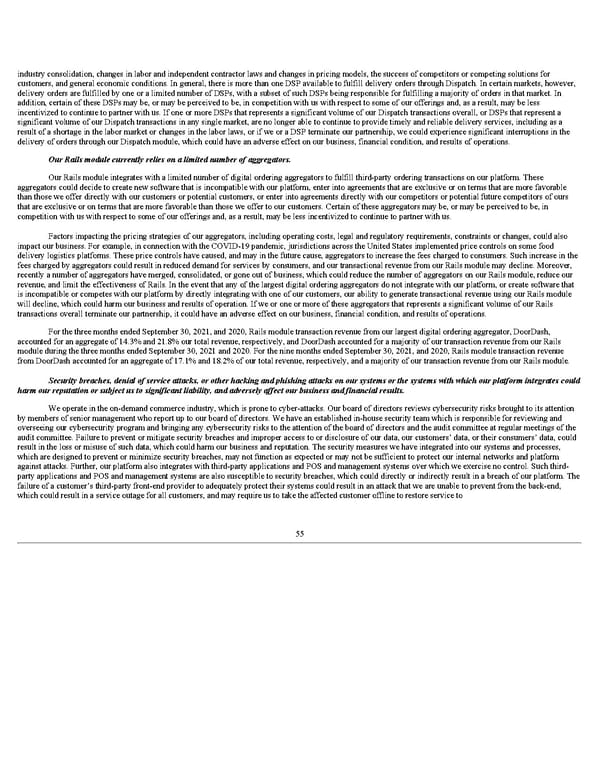industry consolidation, changes in labor and independent contractor laws and changes in pricing models, the success of competitors or competing solutions for customers, and general economic conditions. In general, there is more than one DSP available to fulfill delivery orders through Dispatch. In certain markets, however, delivery orders are fulfilled by one or a limited number of DSPs, with a subset of such DSPs being responsible for fulfilling a majority of orders in that market. In addition, certain of these DSPs may be, or may be perceived to be, in competition with us with respect to some of our offerings and, as a result, may be less incentivized to continue to partner with us. If one or more DSPs that represents a significant volume of our Dispatch transactions overall, or DSPs that represent a significant volume of our Dispatch transactions in any single market, are no longer able to continue to provide timely and reliable delivery services, including as a result of a shortage in the labor market or changes in the labor laws, or if we or a DSP terminate our partnership, we could experience significant interruptions in the delivery of orders through our Dispatch module, which could have an adverse effect on our business, financial condition, and results of operations. Our Rails module currently relies on a limited number of aggregators. Our Rails module integrates with a limited number of digital ordering aggregators to fulfill third-party ordering transactions on our platform. These aggregators could decide to create new software that is incompatible with our platform, enter into agreements that are exclusive or on terms that are more favorable than those we offer directly with our customers or potential customers, or enter into agreements directly with our competitors or potential future competitors of ours that are exclusive or on terms that are more favorable than those we offer to our customers. Certain of these aggregators may be, or may be perceived to be, in competition with us with respect to some of our offerings and, as a result, may be less incentivized to continue to partner with us. Factors impacting the pricing strategies of our aggregators, including operating costs, legal and regulatory requirements, constraints or changes, could also impact our business. For example, in connection with the COVID-19 pandemic, jurisdictions across the United States implemented price controls on some food delivery logistics platforms. These price controls have caused, and may in the future cause, aggregators to increase the fees charged to consumers. Such increase in the fees charged by aggregators could result in reduced demand for services by consumers, and our transactional revenue from our Rails module may decline. Moreover, recently a number of aggregators have merged, consolidated, or gone out of business, which could reduce the number of aggregators on our Rails module, reduce our revenue, and limit the effectiveness of Rails. In the event that any of the largest digital ordering aggregators do not integrate with our platform, or create software that is incompatible or competes with our platform by directly integrating with one of our customers, our ability to generate transactional revenue using our Rails module will decline, which could harm our business and results of operation. If we or one or more of these aggregators that represents a significant volume of our Rails transactions overall terminate our partnership, it could have an adverse effect on our business, financial condition, and results of operations. For the three months ended September 30, 2021, and 2020, Rails module transaction revenue from our largest digital ordering aggregator, DoorDash, accounted for an aggregate of 14.3% and 21.8% our total revenue, respectively, and DoorDash accounted for a majority of our transaction revenue from our Rails module during the three months ended September 30, 2021 and 2020. For the nine months ended September 30, 2021, and 2020, Rails module transaction revenue from DoorDash accounted for an aggregate of 17.1% and 18.2% of our total revenue, respectively, and a majority of our transaction revenue from our Rails module. Security breaches, denial of service attacks, or other hacking and phishing attacks on our systems or the systems with which our platform integrates could harm our reputation or subject us to significant liability, and adversely affect our business and financial results. We operate in the on-demand commerce industry, which is prone to cyber-attacks. Our board of directors reviews cybersecurity risks brought to its attention by members of senior management who report up to our board of directors. We have an established in-house security team which is responsible for reviewing and overseeing our cybersecurity program and bringing any cybersecurity risks to the attention of the board of directors and the audit committee at regular meetings of the audit committee. Failure to prevent or mitigate security breaches and improper access to or disclosure of our data, our customers’ data, or their consumers’ data, could result in the loss or misuse of such data, which could harm our business and reputation. The security measures we have integrated into our systems and processes, which are designed to prevent or minimize security breaches, may not function as expected or may not be sufficient to protect our internal networks and platform against attacks. Further, our platform also integrates with third-party applications and POS and management systems over which we exercise no control. Such third- party applications and POS and management systems are also susceptible to security breaches, which could directly or indirectly result in a breach of our platform. The failure of a customer’s third-party front-end provider to adequately protect their systems could result in an attack that we are unable to prevent from the back-end, which could result in a service outage for all customers, and may require us to take the affected customer offline to restore service to 55
 Q3 2021 10Q Page 60 Page 62
Q3 2021 10Q Page 60 Page 62